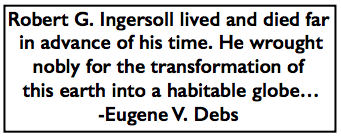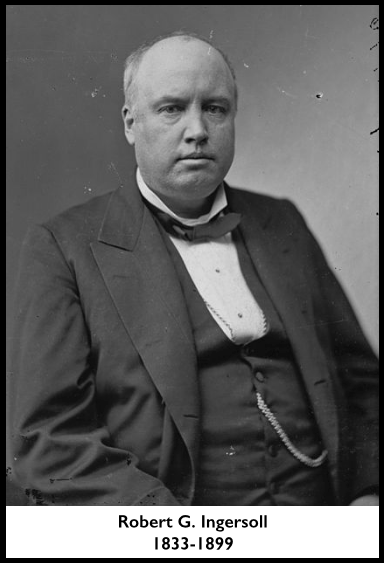 ———-
———-
Hellraisers Journal – Monday July 24, 1899
Tribute to Robert G. Ingersoll by Eugene V. Debs
From the Terre Haute Gazette of July 22, 1899:
Deb’s Tribute to Ingersoll
Numberless tributes will be paid to Robert G. Ingersoll. Not one of them all, however great the love that may inspire it, will be as tender and touching, as beautiful and poetic, as his own enchanting words in the presence of death. His tribute over the remains of his brother, Ebon C., in Washington [D. C.] in 1879, moved by its exquisite tenderness the whole country to tears. Almost every line of it has become classic. What a pity that there is not one, with tongue inspired, to speak such noble words above his pulseless clay. How truly these words, spoken of his brother, apply to himself:
The record of a generous life runs like a vine around the memory of our dead, and every sweet, unselfish act is now a perfumed flower. * * * There was, there is, no gentler, stronger, manlier man.
In the same oration he said:
He who sleeps here, when dying, mistaking the approach of death for the return of health, whispered with his last breath, “I am better now.” Let us believe, in spite of doubts and dogmas, of fears and tears, that these dear words are true of all the countless dead.
What a strange and beautiful coincidence that his own latest words were the same as those of his brother! Asked by his devoted wife how he felt, he answered with a smile, “Oh, better!” and in the same second his great soul winged its way to the farther shore. He died as he wished to die, and again his own words must be quoted:
When the duties of life have all been nobly done; when the sun touches the horizon; when the purple twilight falls upon the past, the present, and the future—then, surrounded by kindred and by friends, death comes like a strain of music. The day has been long, the road weary, and the traveler gladly stops at the welcome inn
For 23 years it has been my privilege to know Colonel Ingersoll, and the announcement of his sudden death is so touching and shocking to me that I can hardly bring myself to realize the awful calamity. Like thousands of others who personally knew Colonel Ingersoll, I loved him as if he had been my elder brother. He was, without doubt, the most lovable character, the tenderest and greatest soul I have ever known. His heart went out to all who suffered and his purse went with it. Scores of incidents of his sympathetic, generous nature came under my own observation, though he was extremely modest and gave without ostentation. He used both hands in scattering his benefactions, but always, when possible, in secret.
A young woman once called at his office in New York. Her father had been rich, but failed. She was a member of an influential church, but her friends deserted her. The church authorities “promised” repeatedly to see what could be done for her. At last she went to Ingersoll and told her story. He gave her a $20 gold piece and requested her to call at the same hour the next day. She was there at the appointed time, and was then informed that arrangements had been made to give her a course of instruction in stenography and typewriting; that all the expense incident thereto had been paid, and that in the meantime any means she would require would be furnished here, and, furthermore, that when she had completed her course a position at a good salary awaited her.
Such incidents of kindness to the distressed and help to the needy might be multiplied indefinitely, for Colonel Ingersoll’s whole life was replete with them and they constitute a religion compared with which all creeds and dogmas become meaningless and empty phrases.
The Ingersoll home in New York is a true type of a rational conception of heaven. Four generations dwell together there, and within that charmed circle Love has autocratic sway. In my visits to this sweet home I felt as if I had become an inhabitant of a new world. Such kindness and such gentleness! And never a harsh word nor an unkind thought. The Colonel was, of course, the central figure in the beautiful group. How eagerly all waited for his homecoming, and how he was surrounded and embraced when he came! He was at once husband, father, brother, lover, companion, and friend, and in each relation his life was truly ideal. I can see the picture yet, and it will remain in memory’s gallery forever.
The home he filled with love and light is now dark, indeed. The very soul has gone out from it, and where but a few hours ago there was song and laughter, there is now grief and lamentation beyond the power of all language to express. The hearts of millions throb sympathetically with the stricken ones in their awful bereavement.
To paraphrase Victor Hugo, in his estimate of Voltaire, “There has died a man. He died immortal.” The name of Robert G. Ingersoll is in the pantheon of the world. More than any other who ever lived, he destroyed religious superstition. Like an electric storm, he purified the religious atmosphere. With dauntless courage and transcendent ability he applied himself to his mission and won an immortality of gratitude and glory.
He was the Shakespeare of oratory—the greatest the world has ever known. Henry Ward Beecher called him “The Golden-Mouthed American,” and once said of him: “Robert Ingersoll is the most brilliant speaker of the English language on the globe.”
His metaphor was marvelous. Here is a specimen, of which there are hundreds in his writings, equal to Shakespeare: “Wit is the lightning of the soul.” Speaking of the Bard of Avon, in a strain of poetic rapture he said: “From his brain there poured a Niagara of gems.”
Robert G. Ingersoll lived and died far in advance of his time. He wrought nobly for the transformation of this earth into a habitable globe, and long after the last echo of detraction has been silenced his name will be loved and honored and his fame will shine resplendent, for his immortality is fixed and glorious.
[Photograph and emphasis added.]
~~~~~~~~~~~~~~~~~~~~~~
SOURCES
Quote EVD fe Robert G Ingersoll, Sc Dem Hld p4, July 29, 1899
https://www.marxists.org/history/usa/pubs/social-democratic-herald-us/990729-socdemherald-v02n06.pdf
Terre Haute Gazette
(Terre Haute, Indiana)
-July 22, 1899
https://chroniclingamerica.loc.gov/lccn/sn84038184/
https://www.marxists.org/archive/debs/works/1899/990722-debs-tributetoingersoll.pdf
From:
Debs Internet Archive
https://www.marxists.org/archive/debs/index.htm
Debs IA – 1899
https://www.marxists.org/archive/debs/index.htm#1899
IMAGE
Robert G. Ingersoll, 1833-1899
https://en.wikipedia.org/wiki/Robert_G._Ingersoll
See also:
Social Democratic Herald
(Chicago, Illinois)
-July 29, 1899, page 4
https://www.marxists.org/history/usa/pubs/social-democratic-herald-us/990729-socdemherald-v02n06.pdf
Henry Ward Beecher
https://en.wikipedia.org/wiki/Henry_Ward_Beecher
~~~~~~~~~~~~~~~~~~~~~~~~~~~~~~~~~~~~~~~~~~~~~
We Only Want the Earth – Visionaries 1916
Lyrics by James Connolly

